Key takeaways:
- Legislative advocacy is crucial for influencing policies that improve the lives of individuals with cerebral palsy, emphasizing the power of personal stories to connect with lawmakers.
- Advocacy in healthcare can lead to tangible improvements in services, as well as raising awareness about the unique challenges faced by individuals with disabilities.
- Building community support networks enhances collaboration and resource sharing among families, empowering them to advocate collectively for meaningful change.
- Effective advocacy strategies include cultivating relationships with decision-makers, utilizing storytelling to humanize issues, and demonstrating persistence in advocating for policy changes.
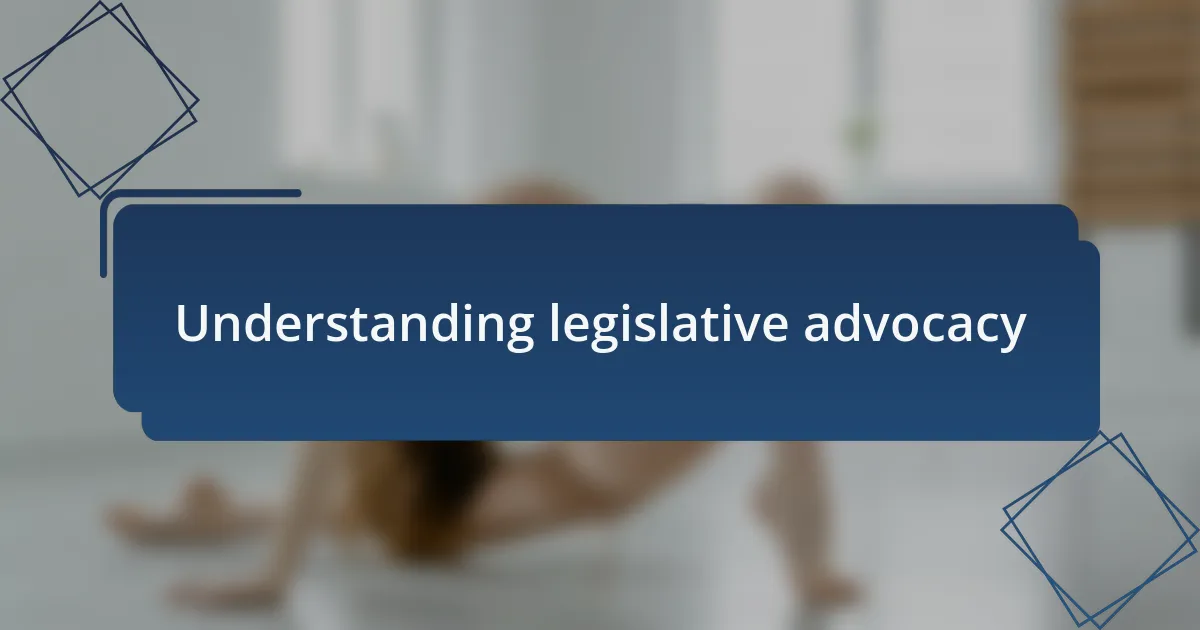
Understanding legislative advocacy
Legislative advocacy is essentially about influencing lawmakers to enact policies that support individuals and communities, particularly those with unique needs, like those of us involved in the cerebral palsy community. Reflecting on my own experiences, I remember attending a town hall meeting where passionate individuals shared their stories. It truly struck me how these personal narratives can empower legislators to understand the critical impact of their decisions.
Moreover, it’s fascinating to consider how each piece of legislation can be a lifeline for individuals with cerebral palsy. Have you ever thought about how a simple law can change someone’s life? For instance, policies ensuring better access to healthcare or educational resources can make a significant difference. This connection between advocacy and real-life outcomes fueled my passion for fighting for change; I often find myself thinking about the children who will benefit from the advocacy work we do today.
Additionally, advocacy involves building relationships with lawmakers, understanding their priorities, and presenting our needs in a way that resonates with them emotionally. One time, I spoke to a state representative about the challenges I faced while navigating state services for my child. Seeing him nod in understanding and empathy made me realize that when we share our stories authentically, we not only highlight our struggles but also make it harder for legislators to ignore the need for change. It’s a powerful reminder of how essential it is to be involved in the legislative process.

Importance of advocacy in healthcare
Advocacy in healthcare often serves as the catalyst for change, especially for those living with cerebral palsy. I recall a time when I advocated for my child’s access to specialized therapies. It was eye-opening to see how one letter to a local representative resulted in an increased allocation of resources for our community. This experience reinforced my belief that advocating for our needs can lead to real, tangible improvements in care.
The importance of advocacy also lies in raising awareness about the specific challenges faced by individuals with disabilities. I remember attending a healthcare summit where advocates shared their stories of daily obstacles. Listening to these narratives reminded me that, while we fight for tangible legislative changes, we are also educating the public and healthcare providers about the unique needs of our community. Isn’t it incredible how conversation can pave the way for understanding and empathy in healthcare?
Moreover, when we engage in advocacy efforts, we become the voice for those who might not be able to speak up for themselves. The stories shared at meetings or through campaigns may resonate with others who feel isolated or unheard. Personally, I’ve found comfort in connecting with other caregivers, knowing that our collective efforts can influence policies that prioritize accessible, quality healthcare. Isn’t that the ultimate goal—to ensure everyone has a fair opportunity to receive the care they deserve?
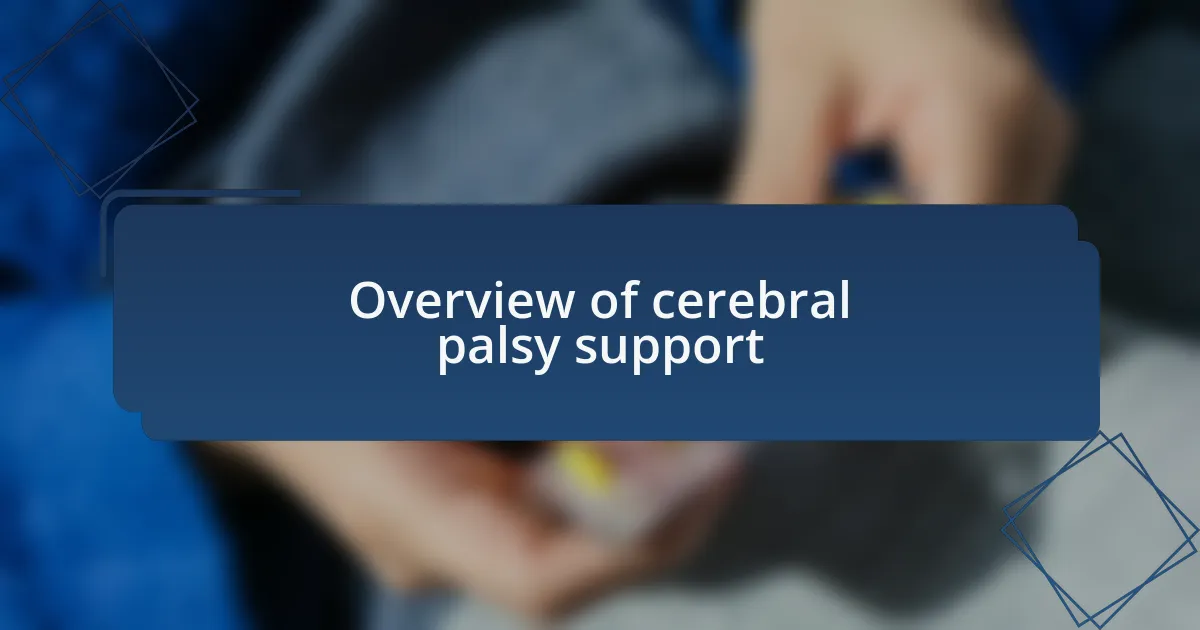
Overview of cerebral palsy support
Cerebral palsy support encompasses a wide range of services designed to improve the quality of life for those affected. From physical and occupational therapies to educational resources, these supports play a crucial role in daily living and personal development. I fondly remember the first time my child participated in a therapeutic riding program; it was heartwarming to witness the joy and growth that came from that experience.
In my journey, I have come to understand just how vital community support can be. Local organizations often provide not only essential services but also a network of understanding and shared experiences among families. I still cherish the friendships I formed at support group meetings; those connections gave me strength during challenging times. Have you ever wondered how much a supportive community can ease the burdens we face? It’s truly transformative.
Moreover, navigating the myriad available resources can be overwhelming. That’s why I believe clear information and guidance should be readily accessible to families seeking support. One time, I stumbled upon a comprehensive resource guide that opened my eyes to assistance I never knew existed. It made me reflect on how crucial it is to demystify these supports so that every family can benefit. What if we could streamline access to these lifelines, ensuring that no one feels lost on their journey?
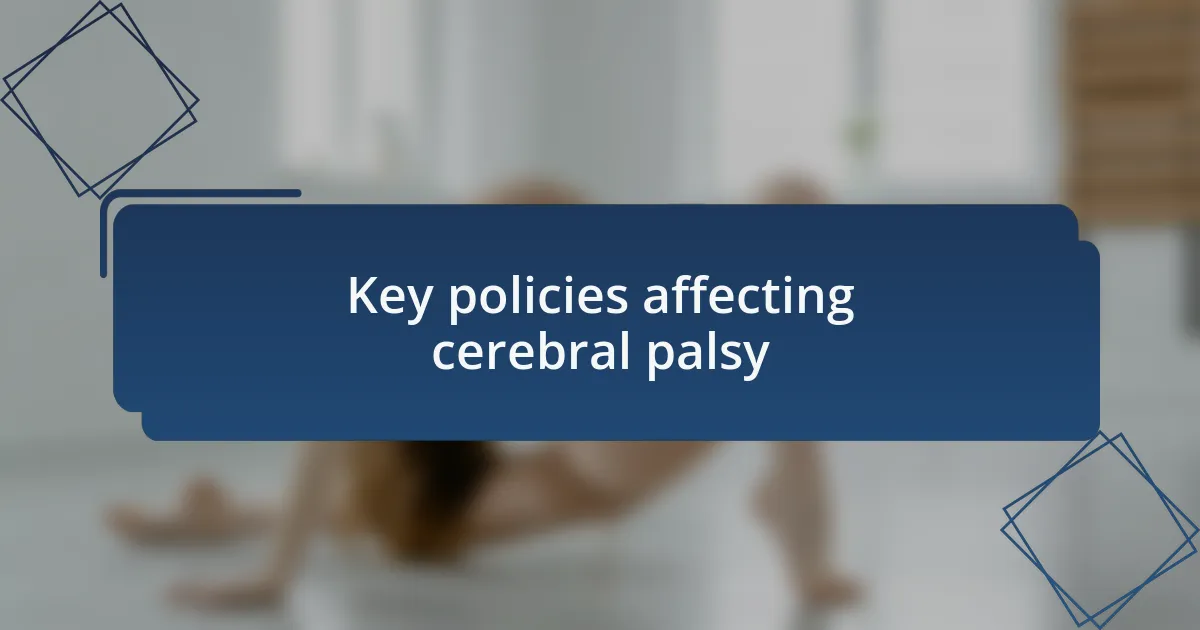
Key policies affecting cerebral palsy
Key policies affecting cerebral palsy significantly impact access to essential services and resources for those affected. For instance, the Individuals with Disabilities Education Act (IDEA) ensures that children with conditions like cerebral palsy receive necessary educational support tailored to their unique needs. I remember attending an Individualized Education Program (IEP) meeting for my child, where I felt empowered by the commitment to his education. How reassuring it is to know that there are policies in place advocating for our children’s right to learn and grow!
Additionally, Medicaid plays a pivotal role in providing necessary medical services, therapy, and support for families dealing with the realities of cerebral palsy. I often think about those families who rely on these services; access to quality healthcare can be a game-changer in their everyday lives. What would happen if these policies weren’t upheld? It’s a stark reminder of the importance of legislative advocacy to protect and expand these vital resources.
Moreover, advocacy for comprehensive policy reform is essential in ensuring equal access to employment opportunities for individuals with disabilities. I recall meeting a young adult with cerebral palsy who expressed frustration over the limited job prospects available to him due to outdated perceptions. This reality begs the question: how can we shift societal views and improve employment policies for those with cerebral palsy? It’s crucial for us to push for progress so that everyone can contribute their talents and skills in a supportive environment.
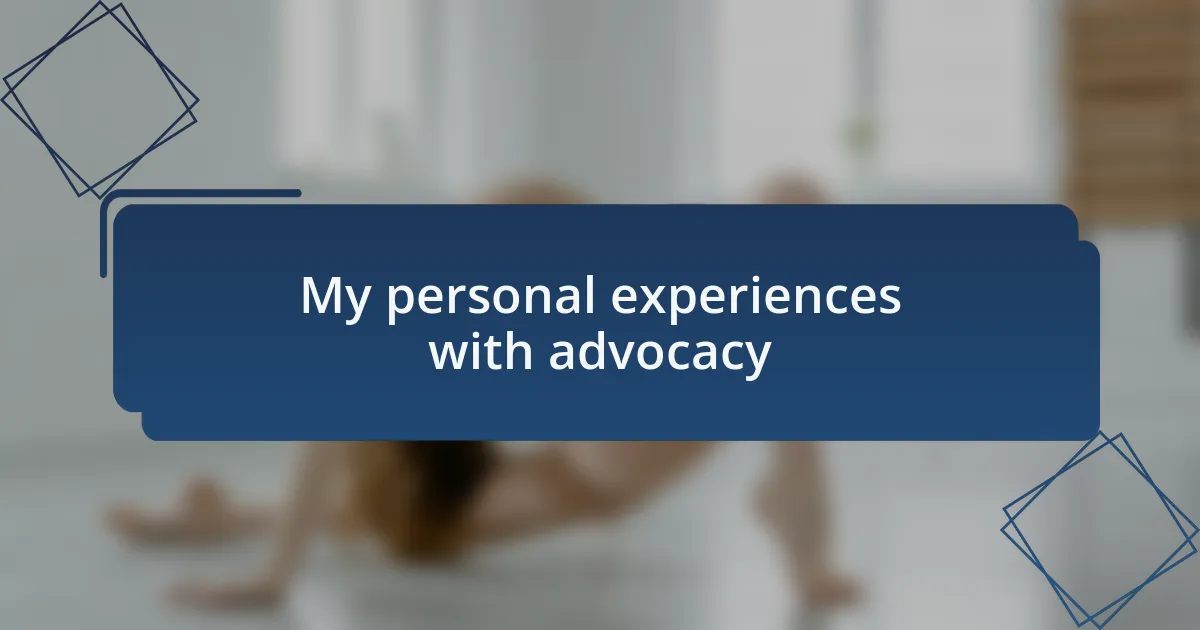
My personal experiences with advocacy
Advocacy has been a personal journey for me, deeply intertwined with my family’s experiences with cerebral palsy. I vividly recall attending a rally supporting disability rights; the passion and determination of fellow advocates ignited a fire within me. Chants of “Inclusion matters!” echoed in my ears, and I realized that we were not just fighting for policies but for the dignity and respect that everyone deserves.
One particularly impactful moment involved speaking with a local legislator about transportation accessibility for people with disabilities. I had brought my child along, and when the lawmaker saw firsthand the challenges we faced, I could see a shift in their expression. It made me wonder: how often do our representatives truly understand the realities we live? That day, I felt the immense value of sharing our stories directly—bringing the realities of cerebral palsy to the forefront and pushing for necessary changes.
Then there was the time I organized a community workshop on navigating healthcare services, where I connected with other parents facing similar battles. Sharing our experiences created a sense of solidarity, and I was reminded of how advocacy extends beyond legislative action; it’s also about building relationships and learning from one another. These moments reinforce the idea that our collective voice can reshape the policies that impact our lives, bettering the world for future generations.
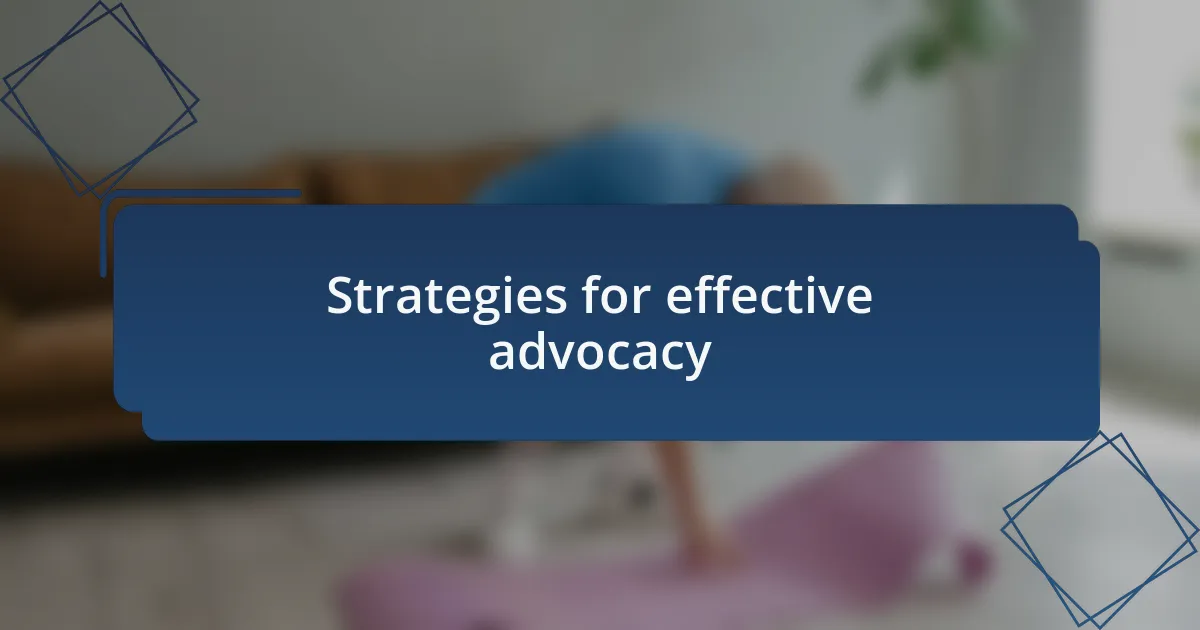
Strategies for effective advocacy
Engaging in legislative advocacy requires a tailored approach, and one vital strategy is to cultivate relationships with decision-makers. I recall attending a local town hall meeting where I introduced myself to officials and shared my experiences with our healthcare system. Building rapport made them more receptive to my perspectives, making me feel like more than just a voice in the crowd; I became a trusted contact.
Another effective strategy revolves around harnessing the power of storytelling. I remember organizing a small event where families shared their journeys with cerebral palsy—each story resonating differently yet highlighting common struggles. This not only humanized the issues for lawmakers but also sparked discussions about real solutions. How can we expect effective policies if legislators are unaware of our lived experiences?
Lastly, persistence is crucial in advocacy. There have been times when I faced setbacks in proposing changes to policies affecting families like mine. But I learned that perseverance pays off; each follow-up email or phone call is another opportunity to reiterate our needs. Have you ever considered how a simple nudge can lead to significant shifts in policy? It’s all about being the consistent voice that refuses to be ignored.
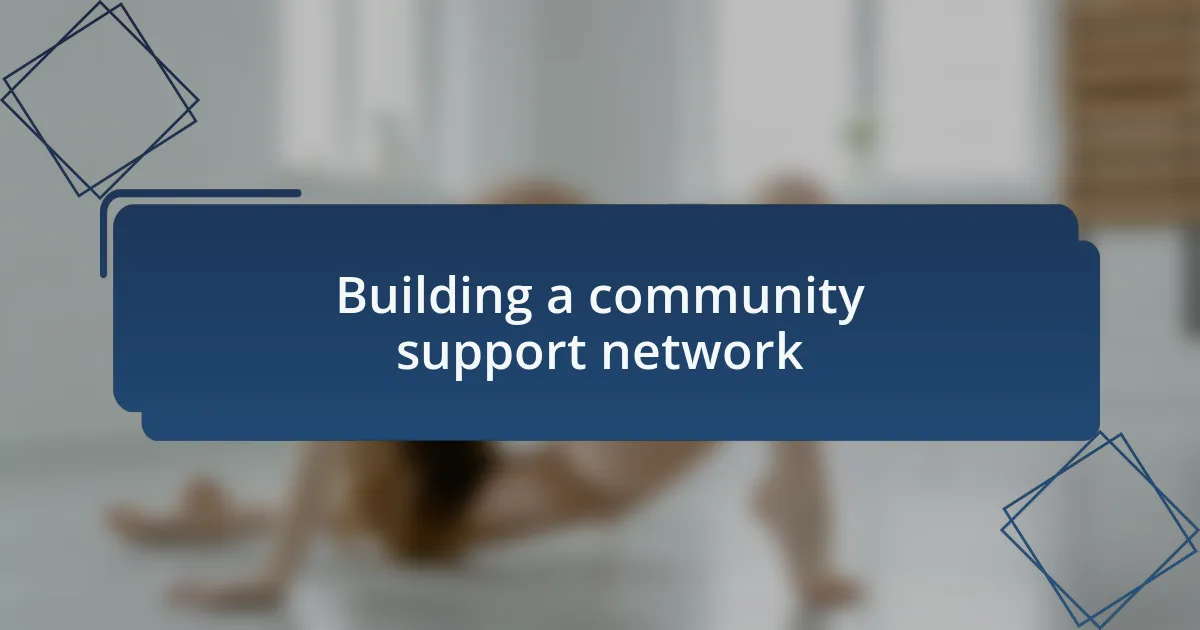
Building a community support network
Building a community support network is about creating connections with individuals who share similar experiences and challenges. I remember when I first joined a local support group for parents of children with cerebral palsy. The moment I stepped into that room, I was overwhelmed by a sense of belonging; I finally found people who understood my struggles and fears. Isn’t it amazing what happens when you’re surrounded by others who know exactly what you’re going through?
As we build these networks, sharing resources becomes essential. I often find myself exchanging information about therapy options or local advocacy events with fellow parents at community meet-ups. These conversations not only empower us but also cultivate a spirit of collaboration. When we share our collective knowledge, we’re not just individuals; we become a united front capable of advocating for meaningful change. How powerful is it to know that together we can elevate our voices?
Moreover, organizing events within the community can significantly strengthen our support networks. I vividly recall hosting a picnic that brought together families and local legislators. It was heartwarming to see laughter and discussions flowing, bridging the gap between those living with cerebral palsy and those making the policies that impact our lives. Isn’t it essential for decision-makers to witness our community’s resilience and determination? Every interaction is a step toward not just raising awareness but fostering a community that supports one another through every challenge.